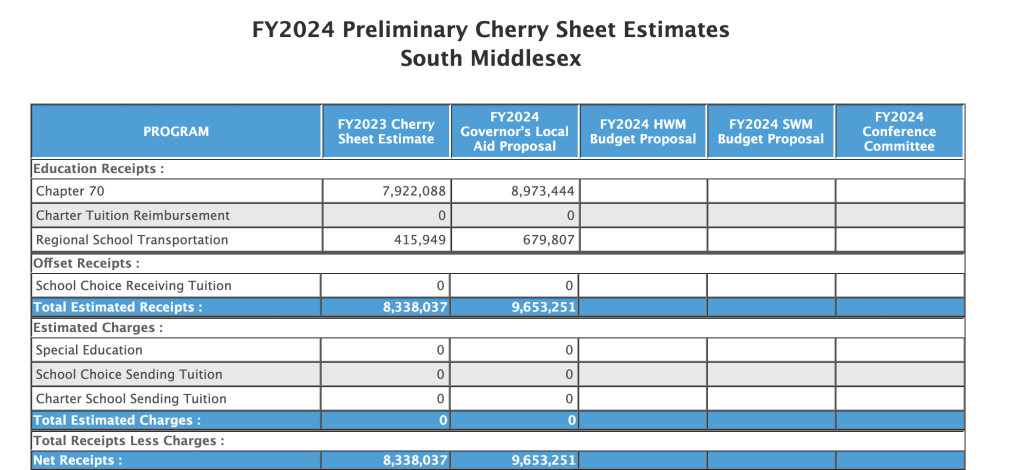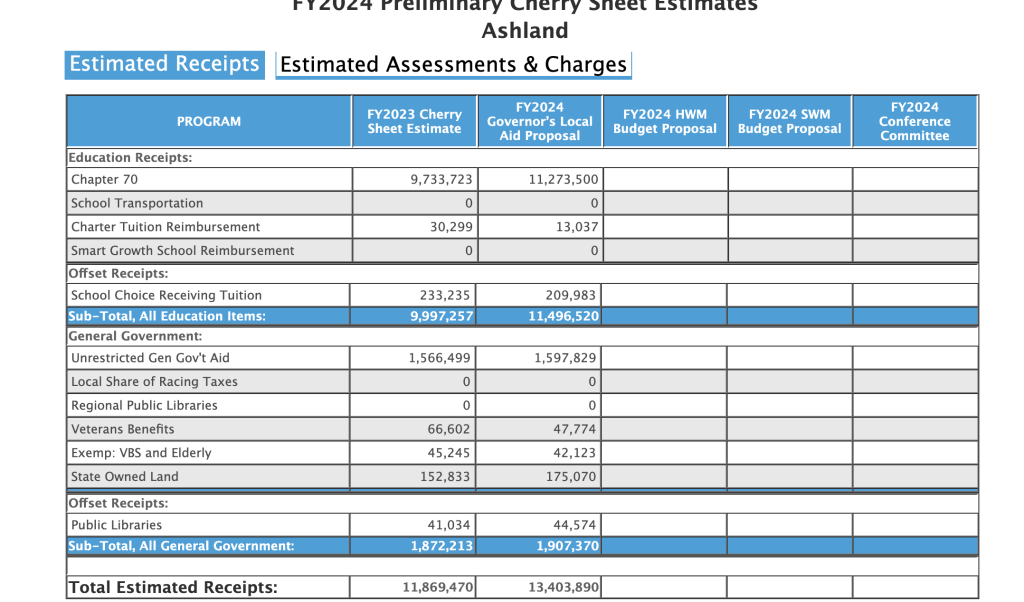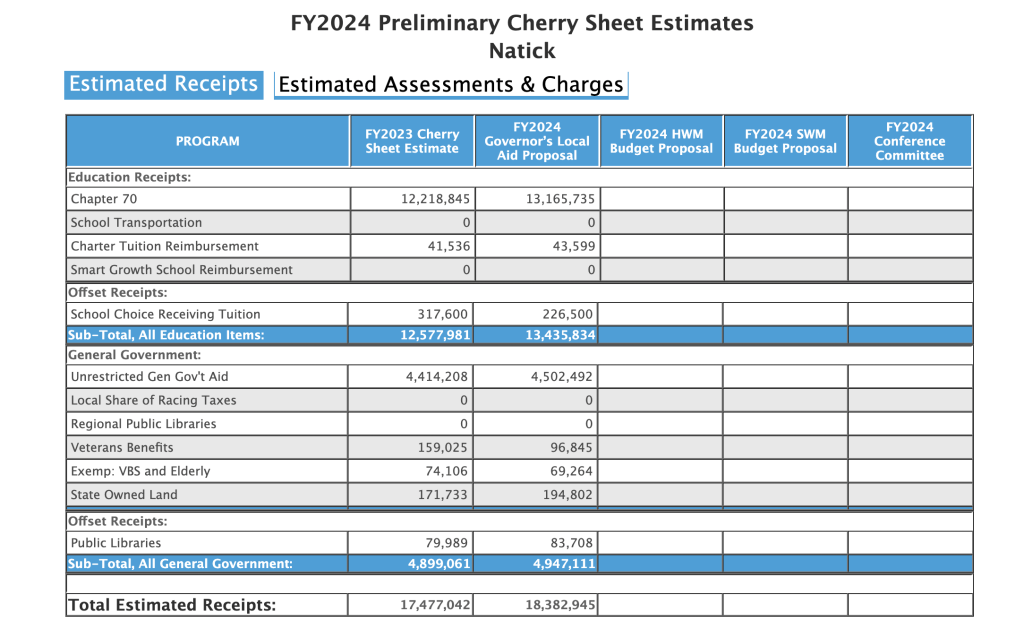In full transparency, the following is a press release from the Governor’s office submitted to SOURCE media.
***
[broadstreet zone=”53230″]
BOSTON – Following through on a commitment to cities and towns that they will provide early notification of funding levels prior to releasing their Fiscal Year 2024 (FY24) budget, Governor Maura T. Healey and Lieutenant Governor Kimberley Driscoll today announced that their upcoming budget will propose historic investments in local aid, including fully funding the Student Opportunity Act. In total, this budget (H.1) proposes to fund nearly $8.4 billion in local aid in fiscal year 2024 – a $635 million or 8.2 percent increase over fiscal year 2023.
Framingham under the proposal would receive:
“The Student Opportunity Act calls for a historic investment in our schools, our students, our educators and their futures. Additionally, these funds will help cities and towns support their first responders, public works, youth violence prevention programs, housing production, cybersecurity and more,” said Governor Healey. “Lieutenant Governor Driscoll and I know that predictability and transparency from state government is essential for municipal leaders to serve their communities – and we’re committed to delivering just that.”
“As a former Mayor, I know firsthand how state funding is the lifeblood for cities and towns and ensures that local government can meet the needs of their communities when it comes to education, transportation and other critical services,” said Lieutenant Governor Driscoll. “Our administration wants to be a strong partner to municipalities, not only by providing them the funding they need, but also by giving them early notification so they know how much money to expect and can start planning to implement it.”
[broadstreet zone=”54526″]
The administration is proposing to fully fund the Student Opportunity Act, meeting the third-year phase-in of a planned six-year implementation and dedicating a significant $6.58 billion to Chapter 70 education. This 9.8 percent increase over the current FY23 General Appropriation Act spending represents the largest nominal investment in Chapter 70 in the state’s history and the largest percentage increase since 1999.
The budget also proposes to fund Unrestricted General Government Aid at $1.26 billion – a $24.6 million, or 2 percent, increase over FY23. This goes beyond the consensus revenue growth estimate when compared to the prior year budget.
“The Healey-Driscoll Administration is committed to making a down payment on Massachusetts’ future by investing in our cities, towns and our students, including historic levels of funding for school districts around the state,” said Administration and Finance Secretary Matthew J. Gorzkowicz. “A strong partnership between state and local government is essential to building the types of vibrant communities that our residents deserve.”
[broadstreet zone=”66385″] |
“By increasing funding for the Student Opportunity Act, we are taking a critical step toward closing the opportunity and achievement gaps that many Massachusetts students still face. This is an investment in every student in the Commonwealth, so that regardless of their zip code or their background, each learner can access the high-quality education they deserve,” said Massachusetts Education Secretary Patrick Tutwiler. “In our first budget, the Healey-Driscoll Administration is making sure these funds get out the door and into communities, so that local school districts and educators can meet the needs of the students they serve – including increasing mental health services, supporting transportation services for students, and addressing the needs of low-income students and English language learners.
H.1 includes a number of other provisions to support cities and towns, especially in serving the educational needs of their students and families. It proposes to fund the Special Education Circuit Breaker at $503 million – a $63 million, or 14 percent, increase over FY23 – to support the full phase-in of out-of-district transportation costs for special education students as a reimbursable expense, as provided for in the Student Opportunity Act.
[broadstreet zone=”56696″] |
That investment includes a $15 million increase in funds available for current year assistance to districts facing extraordinary increases in overall tuition payments, in light of a 14 percent tuition increase at Chapter 766 special education schools, in combination with additional bridge funding to be recommended in an FY23 supplemental budget.
H.1 also fully funds charter school reimbursements at $243 million and increases funding for school transportation accounts by $25.5 million to capture inflation pressures and higher expected need. This includes $5.2 million for non-resident vocational school transportation and $97.1 million for regional school transportation, with both accounts projected to increase the reimbursement rate to 90 percent in FY24. It also includes $28.67 million to fund a projected 100% of homeless student transportation cost under the McKinney-Vento Act.
In addition, H.1 provides $7.5 million for rural school aid, a $2 million (36%) increase over FY23. This program provides rural districts with additional funding for the fixed costs of running a school district and exploring strategies to improve longer-term operational efficiencies.

[broadstreet zone=”53903″]
The budget also increases local aid for public libraries by 12 percent, including:
- Local aid increase for public libraries of $1.6 million to $17.6 million
- Regional Libraries increase of $1.5 million to $15.9 million
- Library Technology increase of $1.4 million to $6.2 million
“For years, our members have been asking for early notification of local funding levels to prepare timely and accurate budgets during this important time period when many towns release or finalize their budgets. The increased certainty and collaboration by the state provides better accuracy for communities to distribute funding and support key programs and services,” said Jill Hai, President of the Massachusetts Municipal Association (MMA). “We’re grateful to Governor Healey and Lieutenant Governor Driscoll for making this a priority in their budget and look forward to continuing this strong partnership between municipal and state leaders in the years to come.”
“Governor Healey and Lieutenant Governor Driscoll have kicked-off the budget season with a solid fiscal blueprint that recognizes the many challenges facing cities and towns,” said MMA Executive Director Geoff Beckwith. “Local officials look forward to working with the Healey-Driscoll Administration and the Legislature to build on and secure vital investments in our schools and essential municipal services, and deeply appreciate their commitment to a powerful state-local partnership.”
“The local aid that the Healey-Driscoll Administration is proposing to allocate to cities and towns is a strong first step in helping us meet the needs of all of our residents,” said Revere Mayor and Massachusetts Mayors’ Association President Brian Arrigo. “By fully funding the Student Opportunity Act, Governor Healey and Lieutenant Governor Driscoll are sending a clear message that they are ready and able to support municipalities in our efforts to offer every student a high-quality education. I’m also grateful to see the administration take action to address a number of challenges municipalities are currently facing, from the high cost of special education to the difficulties we face regarding student transportation.”
[broadstreet zone=”59983″]




